- X marks the spot again - 17th February 2026
- Wordy again part three - 16th February 2026
- ‘Lies, damned lies etc…’ - 13th February 2026

During 23 years with the BBC, and a 41 year journalistic career (when he was trained to use clear and simple language, avoiding jargon), for our Editor, Welshman Phil Parry, it has always been vital to keep up with the latest trends – and this is emphasised by the changing nature of shopping today, which has now been underlined by news that WH Smith is disappearing from the High Street.
Many are in mourning about it, others think it is just a historical inevitability.
 I am talking, of course, about the disappearance of WH Smith from the High Street, which has been widely reported in the media, and a lot of shoppers believe it is another sign of the changing nature of shopping, as online retailers take hold.
I am talking, of course, about the disappearance of WH Smith from the High Street, which has been widely reported in the media, and a lot of shoppers believe it is another sign of the changing nature of shopping, as online retailers take hold.
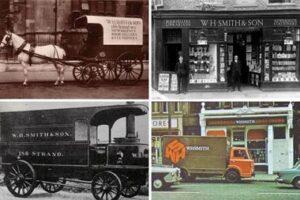
“Going down Smith’s” has long been the traditional cry, not just for shoppers, but also for those growing up – indeed it was in my day.
It was formed by Henry Walton Smith and his wife Anna in 1792 as a news vendor in London, and remained under the ownership of the Smith family for many years.
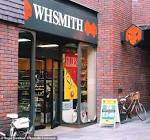
It saw large-scale expansion during the 1970s as the company began to diversify into other markets, and following a rejected private equity takeover in 2004, the company began to focus on its core retail business, being responsible for the creation of the ISBN book identifier.
WH Smith opened its first travel retail store in Euston station in 1848, and then expanded rapidly in the post Second World War years broadening the range of goods on sale.
In the 1970s, it leant into the style of the era with a new brown and orange logo.
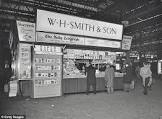
However now WH Smith is the latest one to disappear from the High Street after the firm agreed to sell its shops to Hobbycraft’s Modella Capital.
The new owner has said it will keep the Post Office (PO) outlets that operate in many branches, but will rebrand the High Street chain as TGJones.
The WH Smith name is not being sold, though, and will still be used at airports, railway stations as well as hospital outlets.

But Modella Capital will take over 480 stores in retail parks and shopping centres, as well as on High Streets – including around 5,000 staff.
Modella specialises in retail and consumer businesses.
As well as buying Hobbycraft last year, it has invested in Crafters’ Companion and The Original Factory Shop.


It said it had chosen the TGJones name because it carried “the same sense of family” as WH Smith, which it described as an “iconic” retail business.
Yet so many have gone, and this is just the latest.
Soon for critics the High Street will only be a place of coffee bars, nail bars and tattoo parlours, so all the actual shopping will have to be done over the computer.
Data shows that online shopping may indeed represent a threat, but the story is more complex.
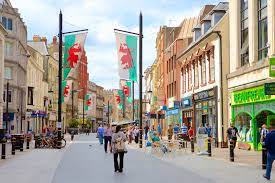
Pre-pandemic data shows there is no clear relationship between the share of vacancy rate on the High Street, and the share of all spend that was made online.
The picture in towns and cities in Wales appears to show the situation across the UK, where it seems that the disappearance of established brands (such as now WH Smith) reflects changing consumer habits, rather than the march of online shopping.

There is no relationship either between the share of ‘non-essential’ spend (clothing, for example, as opposed to groceries) which was made online, and vacancy rates on the High Street.
Places like Worthing, Plymouth, Leicester, Sheffield and Birkenhead all have a similar share of their non-essential spend made online, but very different vacancy rates.
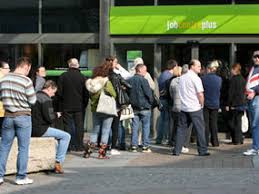
It looks as though it is the performance of the economy in general that matters. This is shown in the data: there is a clear relationship between residents’ wages and vacancy rates.
What that means is that it is the wider economy, and subsequently the presence of high-paid jobs which put money in people’s pockets – so that is the most important factor for a vibrant High Street.
Therefore by all means mourn the loss of WH Smith, but perhaps the others are right too – and it is just a historical inevitability!

The memories of Phil’s astonishing, decades long award-winning career in journalism (when he always tried to keep up with what was happening – like the changing nature of the High Street) as he was gripped by the rare neurological disabling condition Hereditary Spastic Paraplegia (HSP), have been released in the book ‘A Good Story’. Order it now.









